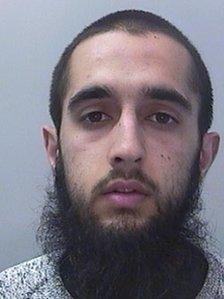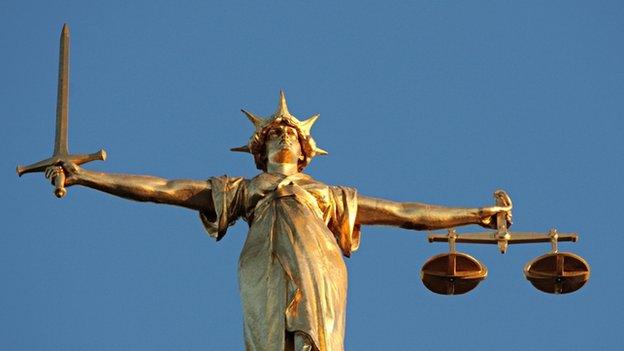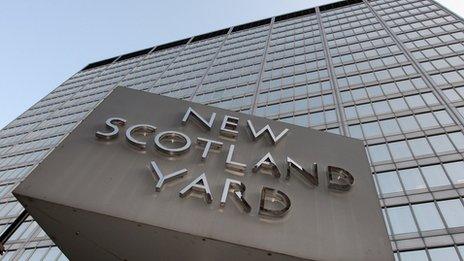'Father of terrorism' Khuram Iqbal jailed at Woolwich Crown Court
- Published

Khuram Iqbal admitted dissemination of terrorist publications
A student calling himself the "father of terrorism" has been jailed for over three years for posting more than 800 links to extremist material online.
Khuram Iqbal, 21, from Cardiff, advertised videos and articles which glorified terrorism for sale on six different Facebook pages.
His online name was Abu Irhaab - Arabic for father of terrorism.
Iqbal admitted charges including the dissemination of terrorist publications at Woolwich Crown Court.
The court was told he was caught with nine copies of al-Qaeda magazine "Inspire" on his laptop when he was arrested on October 8 last year.
Copies of the extremist publication included material designed to attract Muslims to violent anti-Western activities.
One issue featured an article "How to make a bomb in the kitchen of your mum", along with instructions on handling an assault rifle and how to make and detonate a fire bomb.
He had also attempted to join the Jihadist cause when he fled to Kenya with a friend in October 2011, the court heard.
Both had "displayed signs of radicalism prior to travelling", according to prosecutor Roger Smart who explained their families had reported them missing on 8 October of the same year.
The pair were deported following their arrest in Kenya about 20km (12 miles) from the Somali border but faced no further charges on return to the UK.
On 1 August 2012 it was said Iqbal made a second attempt to "join the terrorist cause" by flying to Turkey with two friends.

In 2011 Iqbal was arrested in Kenya near the border with Somalia which is home to the Islamist al-Shabaab militants
Jailing Iqbal for three years and three months, Judge Christopher Kinch QC said some of the material included videos glorifying Jihadi acts of violence, including some by Osama Bin Laden, and praising radical speeches by extremist leaders such as Abu Hamza.
Other videos showed extremist training camps in action in Syria.
Judge Kinch said: "When you disappeared to Kenya it was out of the blue, and caused a lot of anguish to your family.
"You are susceptible to influence by others, and you were struggling with anxiety and panic attacks at the time of offending.
"The overall view is that you are a young man in the grip of extremist influence."

Police found information relating to Osama Bin Laden on Iqbal's laptop
Nathan Rasiar, defending Iqbal, told the court said Iqbal accepted he was subject to "some extreme views".
He said the defendant had been following the situation in Syria and Iraq and wanted to make clear he was against the movement called ISIS, and the atrocities committed in their name.
On 4 January 2013, Iqbal changed his name to Aadam Qaqa Shahin, to obtain a new passport to evade his father's control, the court heard.
The hearing was also told that following the failed Kenya trip, Iqbal was enrolled on the UK government's Prevent program, external - engaging in meetings with Islamic scholars to move away from extremist views.
But during his engagement with the program Iqbal posted a wide range of videos and texts glorifying terrorism.
In total he publicised links to 848 examples of extreme content on the internet
He set up six Facebook profiles, using a new email address to create a new page each time Facebook administrators shut him down.
Iqbal admitted dissemination of terrorist publications and possession of information likely to be useful to a person committing or preparing an act of terrorism.
After the hearing, South Wales Police Assistant Chief Constable Nikki Holland said: "Unfortunately there are a minority of people living in Wales who despite our efforts continue to take extremist views.
"While this is not an issue unique to Cardiff or Wales it is an absolute priority for the force and security services across the UK.
"The communities of Cardiff are determined to live together peacefully and violent extremism will not be tolerated."
- Published4 July 2014

- Published21 October 2011
